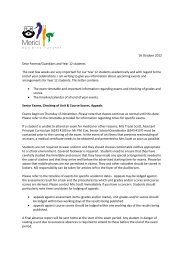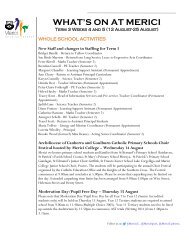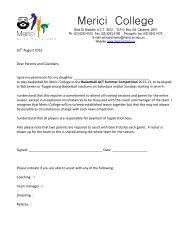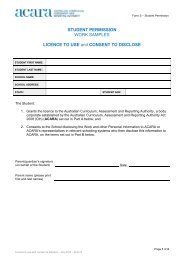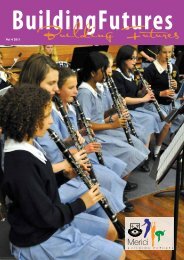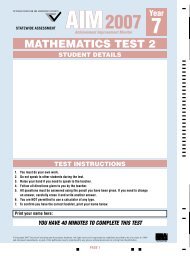Positive Peer Relations (Anti-Bullying and ... - Merici College
Positive Peer Relations (Anti-Bullying and ... - Merici College
Positive Peer Relations (Anti-Bullying and ... - Merici College
You also want an ePaper? Increase the reach of your titles
YUMPU automatically turns print PDFs into web optimized ePapers that Google loves.
<strong>Positive</strong> <strong>Peer</strong> <strong>Relations</strong> (<strong>Anti</strong>-<strong>Bullying</strong> <strong>and</strong> Harassment)Related <strong>Merici</strong> PoliciesBehaviour ManagementSuspension <strong>and</strong> Exclusion of StudentsTechnologyRationale/Purpose<strong>Merici</strong> <strong>College</strong> is a Catholic school which is committed to promoting Christian values where all members ofour community are to be treated with dignity, courtesy <strong>and</strong> respect.We believe that all members of the school community have the right to a learning <strong>and</strong> work environmentfree from intolerance, harassment <strong>and</strong> humiliation.We all share a responsibility to create a culture of caring. This ideal is embedded in our ethos <strong>and</strong> isfostered by our Pastoral Care Policy <strong>and</strong> Practices.Definitions<strong>Bullying</strong> behaviours are a social problem involving an imbalance of power, where there is a deliberateintent to cause harm or distress. These behaviours are sustained over a long period of time are aggressive,repetitive <strong>and</strong> malicious causing embarrassment, pain or discomfort to others.<strong>Bullying</strong> behaviours diminish the life of our community <strong>and</strong> are NOT tolerated in any form. Thesebehaviours include:Verbal:Using offensive names, making threats, teasing, spreading rumours, telling secrets (personal information),using put-downs, persuading another person to unfairly criticise or insult someone, making abusive phonecalls.Non-verbal:Rude gestures, ‘greasies’/menacing looks, staring, following or stalking, refusing to sit with someone,negative body language, text messaging.Physical:Deliberate or intimidating physical contact (eg: shoving/pushing, hitting, punching, <strong>and</strong> tripping). Stealing,hiding, or damaging property or threatening to do so.Relational:Hurtfully excluding others from a group, manipulating friends, rejecting, dismissing or deliberately ignoringothers.Social (bullying based on difference):Targeting students because of appearance <strong>and</strong> possessions; background; racial, cultural <strong>and</strong> religioustraditions; physical <strong>and</strong> intellectual differences.Page 1 of 4
Electronic:Offensive use of social network sites, email, chat rooms, blogs <strong>and</strong> mobile phones( text or speak) <strong>and</strong>misuse of any part of the <strong>Merici</strong> Technology PolicyPlease note: Normal adolescent development can include periods of social conflict, friendship difficulties<strong>and</strong> peer group change. It is important to remember that these do not necessarily constitute bullyingbehaviours.PolicyIt is the policy of the <strong>College</strong> that all students act positively towards each other at all times. It is ourresponsibility to act <strong>and</strong> respond should situations occur which are counter cultural to the aims <strong>and</strong>philosophy of the <strong>College</strong>. Through this policy <strong>and</strong> our actions we aim to:Assist adults <strong>and</strong> students to actively contribute to positive peer relations,Enable all members of the college community to underst<strong>and</strong> their responsibilities <strong>and</strong> rights,Ensure support for persons affected by harassment or bullying,Intervene to implement strategies towards resolution.ProceduresIf information comes to the School about harassment <strong>and</strong> or bullying behaviours occurring either at schoolor outside of school via social networking sites the following steps will occur:1. An initial written summary is received by the relevant Coordinator.2. An assessment is then made as to the level of severity of the incident <strong>and</strong> an appropriate response isset in place. This along with outcomes is to be recorded <strong>and</strong> placed on file.3. Aspects of this response may include: interview all parties <strong>and</strong> mediate negotiate a commitment for change <strong>and</strong> resolution inform all relevant staff of agreed behaviour now expected evaluate effectiveness of resolution processes contact parents refer to School Counsellors <strong>and</strong> possibly outside agencies4. In most cases disciplinary measures may include detention, behaviour contract, removal of privileges,exclusion from excursions, adjustments to individual timetables, isolation during breaks <strong>and</strong>suspension.5. If a student(s) continues to engage in bullying behaviour she/they will be required to attend a formalinterview in the presence of her/their parents with the Assistant Principal (Student Welfare), HouseCoordinator <strong>and</strong> the Principal. At this stage major sanctions can be imposed.Page 2 of 4
Further strategies to support the student who has been bullied will be implemented to provide ongoingassistance. This process often involves School Counsellors <strong>and</strong> parents.Follow-up procedures will usually require observations <strong>and</strong> informal conversations in order to ensure thatthe bullying behaviour has stopped <strong>and</strong> that no retaliations have occurred.Skills of conflict resolution, negotiation <strong>and</strong> teamwork, as well as the development of empathy for others,<strong>and</strong> assertive behaviours, are integrated across the curriculum.Students, parents <strong>and</strong> staff play a key role in anti-bullying <strong>and</strong> harassment <strong>and</strong> should work in partnershipwith the <strong>College</strong> in all aspects of this process.Students:All students are encouraged to:Take some positive action to stop the bullying if they observe an incident,Remember that doing nothing to stop known bullying implies involvement in the bullyingbehaviour,Discuss the problem with friends <strong>and</strong> parents, who may be able to assist with strategies to dealwith the problem,Provide support by reporting the bullying incident to an appropriate staff member,Participate in school activities designed to promote positive peer relations.Parents:All parents are encouraged to:Listen to your daughter <strong>and</strong> take her feelings seriously,Avoid advice such as “not to worry”, “forget it” or “toughen up”,Liaise with the relevant college staff,Help your daughter develop strategies to deal with the bullying behaviours (includingcommunication skills <strong>and</strong> assertiveness),Help your daughter find ways to change the situation,Be aware of your own reactions to avoid conveying mixed messages,Avoid the urge to personally intervene in the situation unless absolutely necessary, as this willmake your child feel less in control,Help your daughter feel good about the other things in her life. Build her self-esteem,When it is clear that your own child is the bully, recognise the seriousness of the issue <strong>and</strong> supportthe school in implementing this policy.Staff:All staff should support our culture of caring for each other, acknowledge the worth <strong>and</strong> contribution of allmembers of the community <strong>and</strong> model appropriate positive behaviours at all times. Staff should treat anyreport seriously, listen to the student <strong>and</strong> reassure her that she has acted correctly in reporting the bullyingbehaviour.All staff should:First ensure that all students involved are safe,Page 3 of 4
Make a brief written summary of the incident, pass it onto a coordinator <strong>and</strong> this process should bediscussed with the student,Ensure that the incident has been followed up by the coordinator,Informally check with the student a week or so later that appropriate action has been taken <strong>and</strong>that resolution procedures have commenced. Continue to provide support for the studentDevelop a common underst<strong>and</strong>ing of unacceptable bullying behaviours <strong>and</strong> the effect these haveon students,Participate in ongoing professional development in this areaReferencesNilFormsNilApproved by:<strong>Merici</strong> ExecutiveImplementation Date: September 2007Policy last Updated: 17 September 2012<strong>Merici</strong> Contact Officer:Assistant Principal – Student WelfarePage 4 of 4



